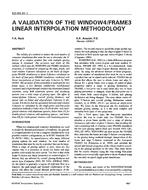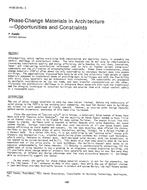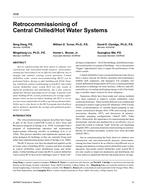Since 1983 over 500 of new housing in the United States has been heated electrically. This can mean increased revenues for many utilities, but it also may create shortages of present and planned generating capacity. Housing that is heated electrically typically has three to six times greater peak demands than housing with gas or oil heating. To avoid the high cost of constructing new power generation, utilities are turning to load management techniques as a more costeffective alternative.
This paper describes how the peak demands of electrically heated housing can be cut in half and still consume the same amount of electricity. Separate studies made by two power companies clearly show the effectiveness of whole house demand controllers in reducing demands and increasing load factors of houses with electric heating.
Units: I-P
Citation: Symposium, ASHRAE Transactions, 1985, vol. 91, pt. 2B, Honolulu, HI
Product Details
- Published:
- 1985
- Number of Pages:
- 14
- File Size:
- 1 file , 2 MB
- Product Code(s):
- D-HI-85-19-4


